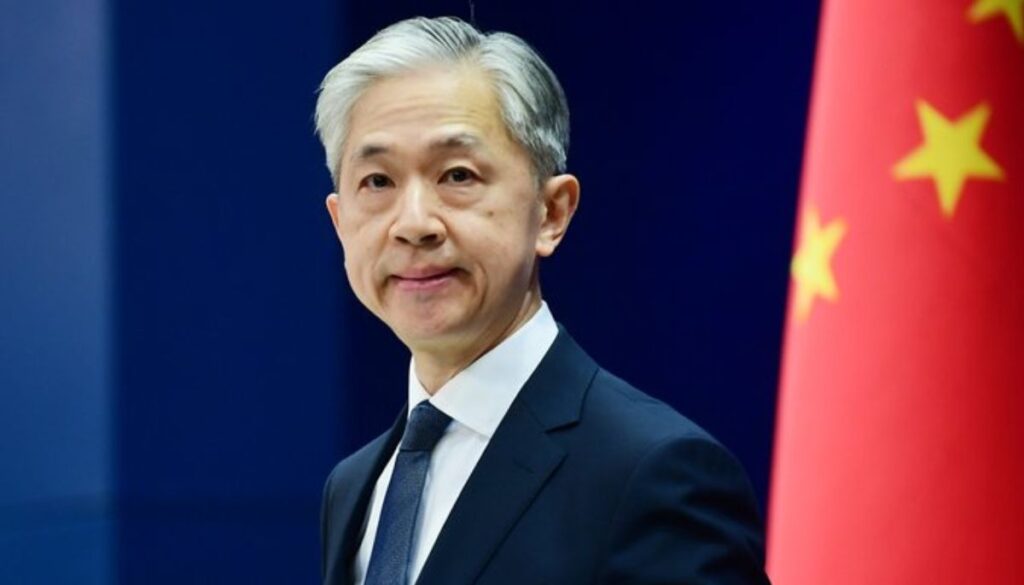As Mohamed Muizzu’s party emerges victorious in the Maldives election, all eyes turn to China for its reaction. Given the strategic interests China holds in the Indian Ocean region, its response carries significant implications.

Following the landslide election victory of pro-Beijing President Mohamed Muizzu’s party in the Maldives, China announced on Monday that it would work to deepen its ties with the island nation. Wang Wenbin, a spokesman for the foreign ministry, stated that “China is willing to work with the Maldives to maintain traditional friendship (and) expand exchanges and cooperation in various fields.”
What China Said After Mohamed Muizzu’s Party Wins Maldives Election
Beijing’s objectives were to “continuously deepen the China-Maldives comprehensive strategic cooperative partnership” in addition to “accelerate construction of a community with a shared future for China and the Maldives, and better benefit the two peoples.”
“We congratulate the Maldives on successfully holding its parliamentary election and fully respect the choice made by the Maldivian people,” Wang said.
According to preliminary results released by the Maldives Election Commission, Muizzu’s People’s National Congress (PNC) has over two-thirds of the 93 seats in the parliament.
Maldives Election: Maldives Is Now A “Major Concern” For India In The Indian Ocean Area Following Muizzu’s Significant Victory for China’s Friend
The People’s National Congress (PNC), led by President Mohamed Muizzu, won a landslide victory in Sunday’s Maldives Election, making the Indian Ocean Region slightly more difficult for New Delhi. The victory indicated resounding support for the party’s pro-China foreign policy position even as India prepared a careful strategy to hold onto the influence it had till last year in the island nation.
Following an anti-India campaign coined “India Out,” Muizzu was elected president of the Indian Ocean island nation in September of last year. Months later, the Maldives held parliamentary elections. He overthrew the Maldivian Democratic Party’s (MDP) “pro-India” former president Ibrahim Mohamed Solih.
The MDP, which had previously had the “super majority” in the parliament, was soundly defeated on Sunday.
In the legislative elections, the PNC secured 70 of the 93 seats in the parliament, gaining complete control of the Majlis, as the Maldivian parliament is called, and ensuring the party a super-majority.
With the geopolitics unfolding in the maritime sphere becoming increasingly contentious compared to that occurring on land, the Maldives has emerged as a centre for strategic contestation between China and India.
Muizzu had supported pro-China former president Abdulla Yameen in the previous year’s presidential contest. The latter was serving an 11-year prison sentence at the time and was facing multiple corruption allegations, so he was unable to contest. This month, his conviction was reversed.
As soon as the results of the parliamentary elections were announced on Sunday, Beijing issued a statement, saying “China is willing to work with the Maldives to maintain traditional friendship (and) expand exchanges and cooperation in various fields”.
According to China’s Foreign Ministry spokesperson Wang Wenbin, Beijing has decided to “continuously deepen the China-Maldives comprehensive strategic cooperative partnership” and “accelerate construction of a community with a shared future for China and the Maldives, and better benefit [for] the two peoples”.
Wang continued, “We salute the Maldives for organising a successful parliamentary election and we wholeheartedly accept the decision made by the Maldivian people.”
Even as Prime Minister Narendra Modi runs for a third term in the current parliamentary elections, India has yet to respond.
The “outcome of the elections suggests public support of President Muizzu’s policies, including foreign policy towards India,” according to Nilanthi Samaranayake, an adjunct fellow at the Washington-based think tank East-West Centre, in an interview with ABPLive.
“Muizzu is probably going to have more latitude in pursuing his foreign policy goals. She continued, “He has expressed his desire for collaboration with India, but on renegotiated terms, such as the substitution of civilians for Indian military personnel operating planes. “However, some of his plans, like a possible free trade agreement with China, might not sit well with India.”
FAQs:
- What is Mohamed Muizzu’s party’s significance in Maldives politics?
- Mohamed Muizzu’s party, while relatively new, has gained traction for its promises of economic development and stability in the Maldives. Its victory signals a shift in the country’s political landscape.
- Why is China’s response crucial in the aftermath of the Maldives elections?
- China’s response holds significance due to its growing influence in the Indian Ocean region. The Maldives serves as a key strategic location for China’s Belt and Road Initiative (BRI), and its stance on the election outcome could impact bilateral relations and regional dynamics.
- What factors might influence China’s reaction to Muizzu’s party victory?
- China’s response could be influenced by various factors, including its economic interests in the Maldives, its strategic goals in the Indian Ocean, and its broader geopolitical agenda. Additionally, China’s relationship with the outgoing government and its assessment of Muizzu’s party’s policies may also play a role.
- How might China’s response shape future developments in the Maldives?
- China’s reaction to the election outcome could impact future developments in the Maldives, including infrastructure projects, economic cooperation, and diplomatic relations. Depending on China’s assessment of the new government’s policies, there could be shifts in the nature of China-Maldives cooperation and regional dynamics.










